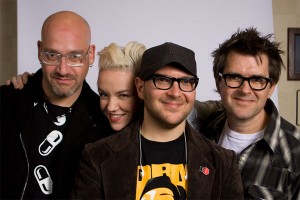
Boing Boing editors David Pescovitz, Xeni Jardin, Cory Doctorow and Mark Frauenfelder. (Image by Dave Bullock.)
Boing Boing, the king of personal blogs that aspire to any level of cerebralness, is sort of an accidental giant. It started as a tiny print zine during the ’80s and became the least likely giant-traffic blog on the web. In an article for Fast Company, Rob Walker profiles the four principals behind the site. An excerpt:
“‘Boing Boing is a holdover from a time when the best blogs were written by smart people who posted whatever was interesting to them,’ observes Jonah Peretti, founder of BuzzFeed. Sure, there are still many such blogs around, but the blogosphere overall has changed radically, with the dominant players falling into recognizable categories — tech (Gizmodo, Engadget), gossip (TMZ, Gawker), politics (the Huffington Post, Politico) — and generally created by teams of professionals looking for growth and profits. ‘The new generation of postpersonal blogs,’ Peretti adds, ‘are much bigger.’
Yet boingboing.net remains among the most popular 10 or 20 blogs around. According to Quantcast data, it gets about 2.5 million unique visitors a month, racking up 9.8 million page views, a traffic increase of around 20% over 2009. It attracts blue-chip advertisers such as American Express and Verizon. It makes a nice living for its founders and a handful of contract employees.
And what really makes it interesting is that it does this with a mix of material that remains as eclectic, strange, and sometimes nonsensical as the obscure personal blog it started out as. Sure, the site offers its take on big, hot-button topics like WikiLeaks or the latest Apple gadgetry. But just as prominent are headlines such as ‘And now, an important message regarding elves,’ or ‘Heavily stapled phone-pole,’ or, to cite a recent favorite of mine, ‘Monkey rides a goat’ (an animated GIF of exactly that).
How can this mishmash command an audience of millions? Particularly now, when the ‘postpersonal’ blogosphere offers slick, focused, comprehensive takes on any subject you can imagine? Maybe the founders’ insistence on keeping the site weird, loose, personal, and fundamentally unprofessional is exactly what keeps the crowd coming back. Boing Boing’s longevity hasn’t happened despite its refusal to get serious, but because of it.”


